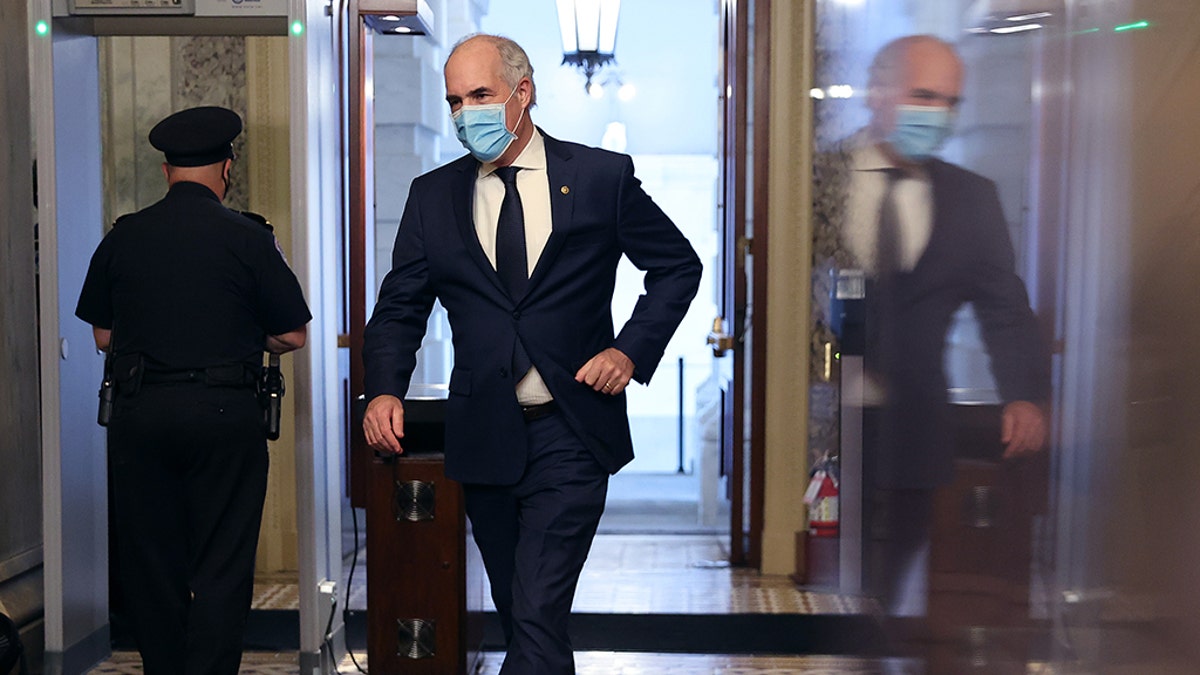Fox News Flash top headlines for May 29
Fox News Flash top headlines are here. Check out what's clicking on Foxnews.com.
Sen. Bob Casey, D-Pa., revealed Friday he has tested positive for coronavirus antibodies and will donate plasma to help others battling the virus.
“On Wednesday afternoon, I received the results of a COVID-19 ELISA IgG Antibody Test, which were positive," Casey said in a statement. "This positive test means that I likely had COVID-19 at some point over the last several months and have since developed an antibody response to the virus."
SEN. TIM KAINE AND WIFE TEST POSITIVE FOR CORONAVIRUS ANTIBODIES
Sen. Tim Kaine, D-Va., also announced this week that he and his wife also had a positive antibody test. Sen. Rand Paul, R-Ky., was the first senator who was diagnosed with COVID-19 in real-time by taking a diagnostic test.

WASHINGTON, DC - MAY 18: Wearing a face mask to reduce the chance of transmission of the novel coronavirus, Sen. Robert Casey (D-PA) arrives at the U.S. Capitol for a vote May 18, 2020 in Washington, DC. The Senate is back in session during the COVID pandemic for a procedural vote on the nomination of Scott Rash to serve as federal district judge in Arizona. (Photo by Chip Somodevilla/Getty Images)
Casey was sick earlier this spring with a low-grade fever and some mild flu-like symptoms. After talking to his doctor, he quarantined at home in Scranton for two weeks and didn't seek medical care since his symptoms were manageable, the senator said.
"My fever went away on its own by mid-April, and it was never recommended that I be tested for the virus," Casey said.
CLICK HERE FOR FULL CORONAVIRUS COVERAGE
But recently, Casey consulted Dr. Brian Monahan, the Capitol’s attending physician, and received the blood test to see if his mild sickness earlier this spring could have been COVID-19.
The results showed Casey had "substantial levels of COVID-19 antibody in my blood, significantly more than the amount required to qualify me as a plasma donor," Casey said.
Casey said he's making his first plasma donation Friday in Taylor, Penn., to help others fighting the virus.
COVID-19 has now killed more than 100,000 Americans.

UNITED STATES - JANUARY 27: Sen. Bob Casey, Jr., D-Pa., walks through the Senate Reception Room to the Senate chamber for the start of the Senate impeachment trial proceedings on Monday, Jan. 27, 2020. (Photo By Bill Clark/CQ-Roll Call, Inc via Getty Images)
The presence of antibodies for a certain disease in someone's system is a reliable indicator that he or she has had that illness in the past. Antibodies, according to a CDC page on the coronavirus, typically "help fight off infections and usually provide protection against getting that disease again (immunity)." But it remains unclear how much immunity they provide from getting the coronavirus again.
CLICK HERE TO GET THE FOX NEWS APP
Given the uncertainly, Casey and Kaine both said they'll continue to follow the advice of public health experts by wearing masks and follow social distancing guidelines. Meanwhile, Paul has chosen not to wear a mask, claiming immunity.
Fox News' Tyler Olson contributed to this report.













































